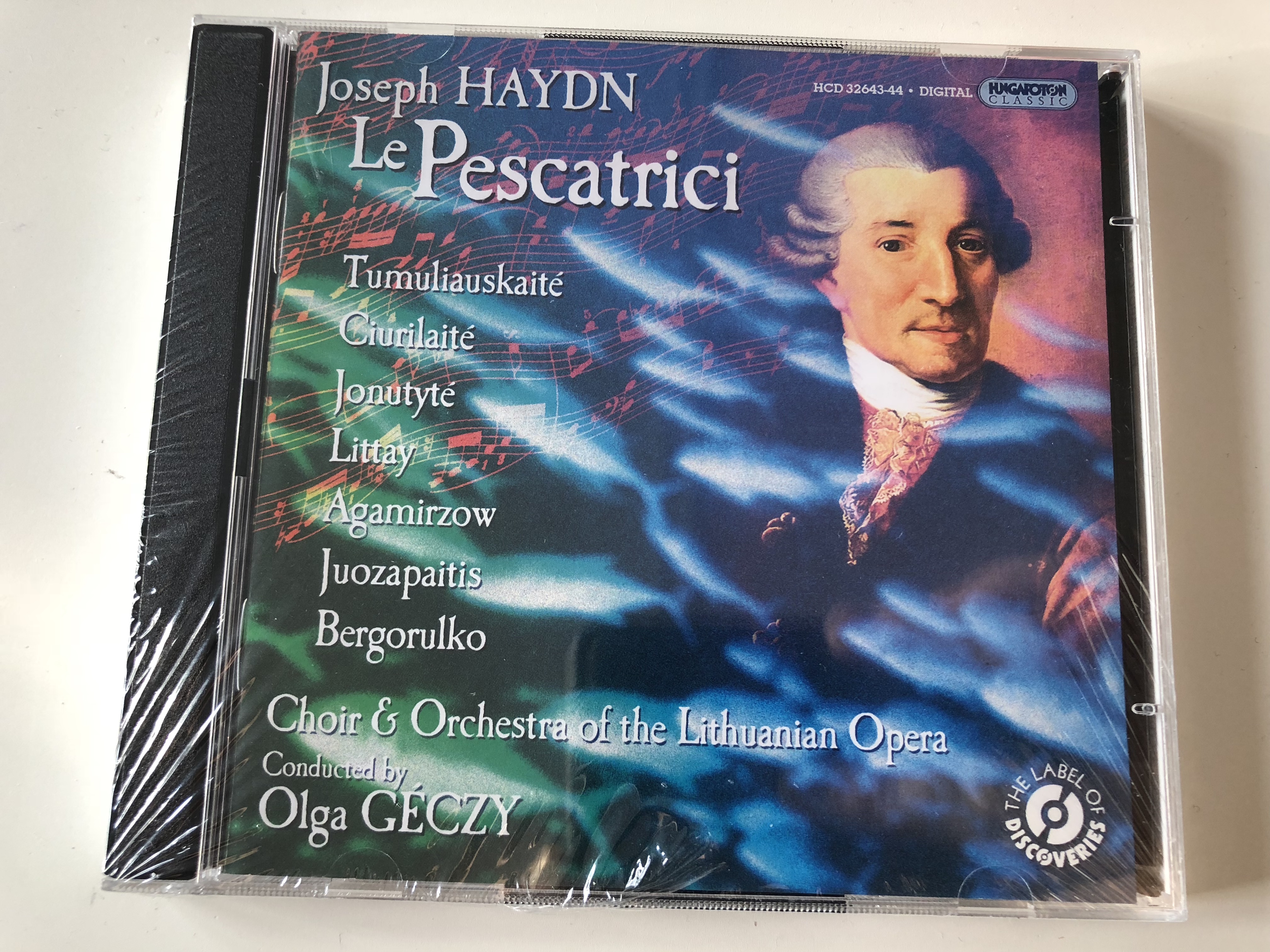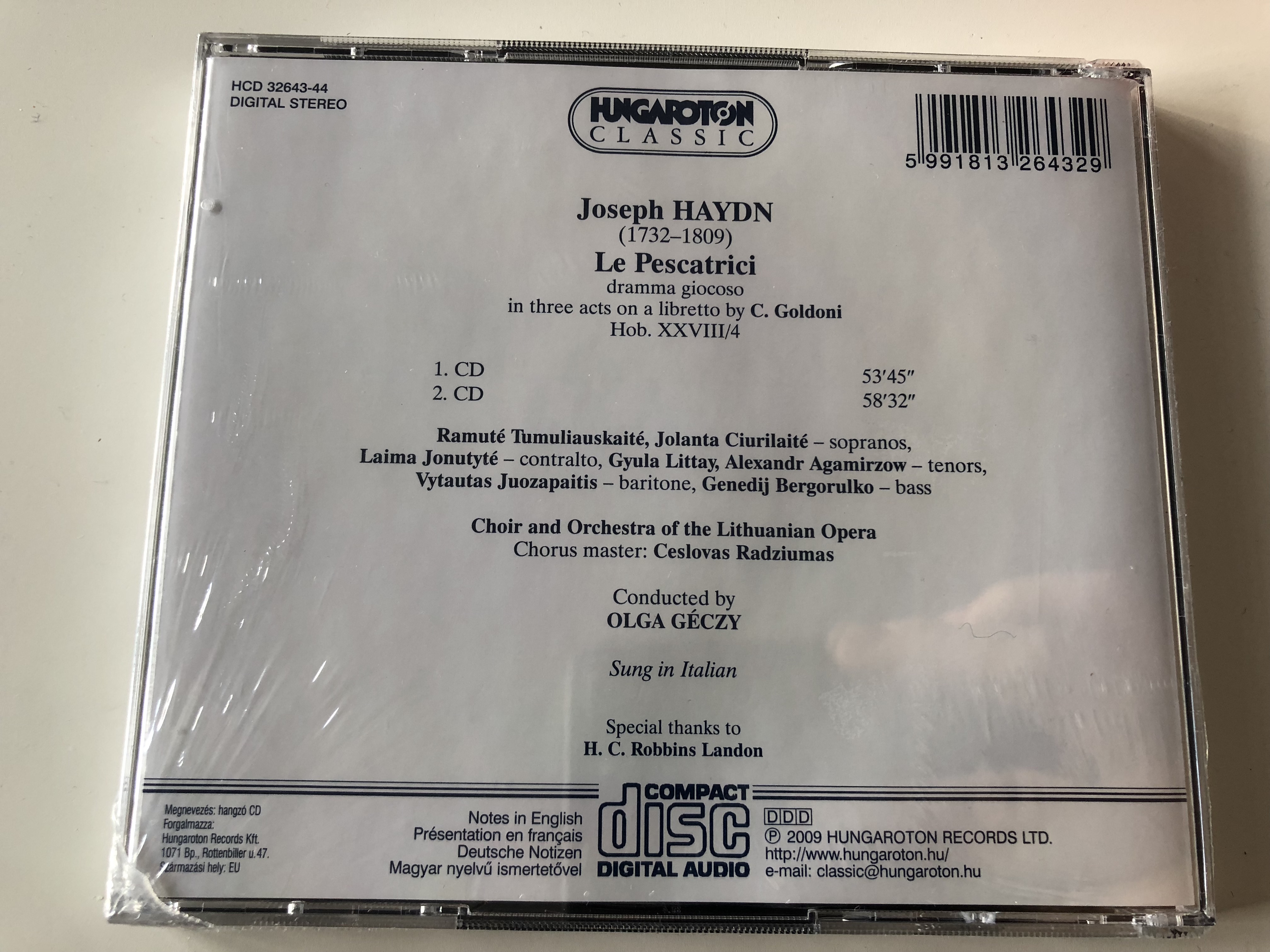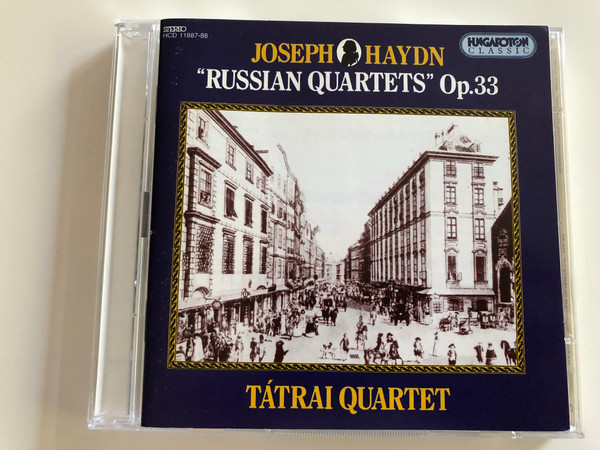Description
Joseph Haydn – Le Pescatrici / The Fisherwomen (Hungaroton Classic, 2 CD Set)
Product Information
- UPC: 5991813264329
- Format: Audio CD
- Number of Discs: 2
- Label: Hungaroton Classic
- Release Year: 2009
- Language: Italian (Libretto in English, French, German, and Hungarian)
- Performers: Jolanta Ciurilaite, Ramute Tumuliauskaite, Alexandr Agamirzow, Gyula Littay, Vytautas Juozapaitis
- Chorus Master: Ceslovas Radziumas
Overview
Joseph Haydn’s opera Le Pescatrici (The Fisherwomen) is a brilliant example of 18th-century dramma giocoso, blending comedy and romance with Haydn’s signature musical ingenuity. Originally composed in 1770 to celebrate the wedding of Maria Theresa Countess Lamberg, the opera premiered at the grand Eszterháza palace. The libretto by the famed Carlo Goldoni had been previously set by composers such as Ferdinando Bertoni and Niccolò Piccinni, but Haydn’s version remains a gem of Classical opera.
This exquisite recording, released by Hungaroton Classic in 2009, captures the opera’s elegance and wit, performed by a distinguished cast of soloists and orchestra. The album features historically informed performance practice, making it a must-have for lovers of Haydn’s operatic works.
Hungarian Translation – Áttekintés
Joseph Haydn Le Pescatrici (A halászleányok) című operája a 18. századi dramma giocoso egyik legkiemelkedőbb példája, amely ötvözi a komédiát és a romantikát Haydn zseniális zenei megoldásaival. Az eredeti mű 1770-ben született Maria Theresa grófnő esküvőjére, és az Eszterháza palotában mutatták be. Carlo Goldoni híres librettója korábban más zeneszerzők kezében is megjelent, de Haydn változata maradt az egyik legkiemelkedőbb klasszikus operai alkotás.
Ez a kiváló minőségű felvétel, amelyet a Hungaroton Classic 2009-ben adott ki, visszaadja az opera eleganciáját és humorát egy kiváló szólistákból és zenekarból álló együttes tolmácsolásában. Az album történelmileg hiteles előadásmódot kínál, így elengedhetetlen minden Haydn-rajongó számára.
Interesting Facts
- A Lost Treasure Reconstructed – A significant portion of Haydn’s original manuscript was lost in an 18th-century fire. The opera was later reconstructed in 1965 by Haydn scholar H.C. Robbins Landon and composer Karl Heinz Füssl.
- A Royal Wedding Commission – Le Pescatrici was composed to celebrate the marriage of Maria Theresa Countess Lamberg and Count Alois Poggi at Eszterháza, showcasing Haydn’s close connection with the Esterházy court.
- A Unique Blend of Comedy and Emotion – Combining playful duets, humorous ensembles, and deeply expressive arias, the opera offers a captivating musical experience.
- Rare Performances & Revivals – The opera was revived in Amsterdam (1965), Paris (1967), Metz (1985), and Garsington (1997). The bicentenary of Haydn’s death in 2009 saw performances in Vienna, London’s Wigmore Hall, and the United States.
- A Star-Studded Cast – This recording features acclaimed vocalists from Lithuania’s leading opera ensembles, guided by chorus master Ceslovas Radziumas.
Hungarian Translation – Érdekes Tények
- Egy elveszett kincs rekonstrukciója – Haydn eredeti kéziratának jelentős része elveszett egy 18. századi tűzvészben. Az operát 1965-ben rekonstruálták H.C. Robbins Landon és Karl Heinz Füssl közreműködésével.
- Királyi esküvői megrendelés – Le Pescatrici Maria Theresa grófnő és Alois Poggi gróf esküvőjére készült, bemutatva Haydn szoros kapcsolatát az Esterházy-udvarral.
- A komédia és érzelem egyedülálló keveréke – Az opera vidám duettjei, humoros együttes jelenetei és mélyen kifejező áriái lenyűgöző zenei élményt nyújtanak.
- Ritka előadások és újjáéledés – Az operát 1965-ben Amszterdamban, 1967-ben Párizsban, 1985-ben Metzben és 1997-ben Garsingtonban mutatták be újra. Haydn halálának 200. évfordulóján (2009) Bécsben, a londoni Wigmore Hallban és az Egyesült Államokban is előadták.
- Csillagos szereposztás – A felvételen Litvánia vezető operai együtteseiből származó kiváló énekesek hallhatók, Ceslovas Radziumas kórusmester vezetésével.
Track Listings
Disc 1
2. Le pescatrici, opera, H. 28/4: Act 1. Recitativo. O, voi fareste meglio
3. Le pescatrici, opera, H. 28/4: Act 1. Aria. Tra tuoni, lampi e fulmini
4. Le pescatrici, opera, H. 28/4: Act 1. Recitativo. Vanta, Lesbina, vanta
5. Le pescatrici, opera, H. 28/4: Act 1. Aria. So far la semplicetta
6. Le pescatrici, opera, H. 28/4: Act 1. Recitativo. Ma io non son sciocca
7. Le pescatrici, opera, H. 28/4: Act 1. Aria. Fra cetre e cembali ti sposero
8. Le pescatrici, opera, H. 28/4: Act 1. Recitativo. Povero Frisellino
9. Le pescatrici, opera, H. 28/4: Act 1. Aria (Cavatina). Voglio amar e vuo scherzare
10. Le pescatrici, opera, H. 28/4: Act 1. Recitativo. O, cara liberta
11. Le pescatrici, opera, H. 28/4: Act 1. [Orchestral interlude]
12. Le pescatrici, opera, H. 28/4: Act 1. Recitativo. Amico
13. Le pescatrici, opera, H. 28/4: Act 1. Aria. Compatite la vecchiezza
14. Le pescatrici, opera, H. 28/4: Act 1. Recitativo. Ah, voglia il cielo, amici
15. Le pescatrici, opera, H. 28/4: Act 1. Aria. Varca il mar in sponda in sponda
16. Le pescatrici, opera, H. 28/4: Act 1. Duetto, Recitativo e Aria. Lesbina, ben trovata
17. Le pescatrici, opera, H. 28/4: Act 1. Recitativo. Insomma cosi e
18. Le pescatrici, opera, H. 28/4: Act 1. Bell'ombra gradita
19. Le pescatrici, opera, H. 28/4: Act 1. Recitativo. Amici
20. Le pescatrici, opera, H. 28/4: Act 1. Solo, Coro. Fiera strage dell'indegno
21. Le pescatrici, opera, H. 28/4: Act 1. Recitativo. Ah, non vorrei
22. Le pescatrici, opera, H. 28/4: Act 1. Finale (Quartetto). Principessa
Disc 2
Publishers
Released by Hungaroton Classic in July 2009 with reconstructed orchestration by H.C. Robbins Landon & Karl Heinz Füssl.
We value your feedback! Share your experience with this product to help others make informed decisions. Your review is important to us!
Hashtags
- English: #JosephHaydn #LePescatrici #OperaRecording #HungarotonClassic #RareOpera #CarloGoldoni #HistoricalOpera #HaydnOpera
- Hungarian (Címkék): #JosephHaydn #LePescatrici #OperaFelvétel #HungarotonClassic #RitkaOpera #CarloGoldoni #TörténelmiOpera #HaydnOperák
















